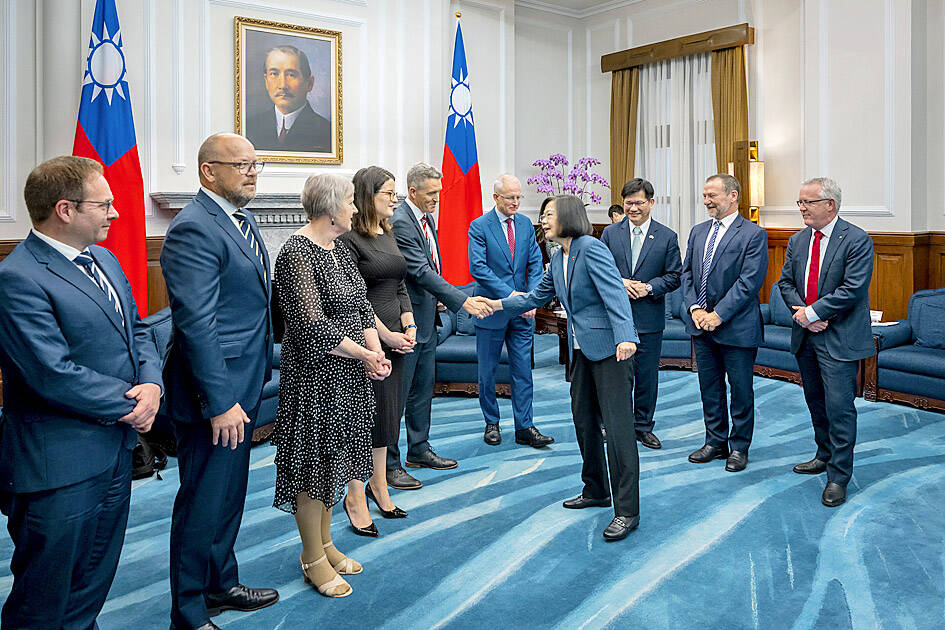Australia is committed to working with Taiwan and other Indo-Pacific partners to safeguard regional peace and stability as it serves the common interests of the people of Australia and Taiwan, Australian lawmaker Josh Wilson said yesterday.
Wilson and Australian lawmaker Paul Fletcher are leading a delegation of cross-party Australian lawmakers to Taiwan for a visit until tomorrow.
During a meeting with President Tsai Ing-wen (蔡英文) at the Presidential Office in Taipei yesterday, Wilson said that Australians and Taiwanese hope for a peaceful, stable, environmentally sustainable and prosperous Indo-Pacific region.

Photo: Presidential Office via AP
Working together with regional partners to build an open and inclusive Indo-Pacific region based on respectful and collaborative participation in the rules-based order is “both sensible and right,” he said.
It is also the only way to successfully tackle common challenges such as climate change, he added.
Wilson said that he believes relations between the two sides would become even stronger, especially in areas such as clean energy transition, critical minerals, education and tourism.
Wilson commended Tsai for her contributions to democracy and governance in Taiwan, and to good governance in the region through her “sustained and progressive leadership.”
Fletcher said that with the two major parties in Australia both represented, the delegation hoped to “further the warm relationship between Australia and Taiwan.”
It is Australia’s hope that it can maintain close contact with Taiwan, as it is an important economic partner and “a valued democracy” in the Indo-Pacific region, he said.
Overseas Taiwanese in his constituency recently held an event to celebrate new progress in relations between Taiwan and Australia — imports of Taiwanese pineapples, which he very much enjoyed, Fletcher said.
Tsai thanked the delegation for demonstrating Australia’s cross-party support for Taiwan, adding that the Australian parliament has long been a key force in advancing Taiwan-Australia relations.
She also extended her gratitude to Australia for underlining the importance of peace and stability in the Taiwan Strait and supporting Taiwan’s international participation.
Taiwan has become Australia’s fifth-largest trading partner and fourth-largest export market thanks to joint efforts by both sides, the president said.
Taiwan looks forward to continuing to bolster economic cooperation with Australia, which is the nation’s largest energy provider and a major source of agricultural goods, she added.
Tsai also called on the Australian government and parliament to support Taiwan’s bid to join the Comprehensive and Progressive Agreement for Trans-Pacific Partnership (CPTPP) to promote economic growth and sustainable development in the region.
Later yesterday, the delegation met with Legislative Speaker You Si-kun (游錫堃), who also called for its support for Taiwan’s bid to join the CPTPP.
Taiwan plays an important role in restructuring global supply chains in the post-COVID-19 pandemic era, You said, adding that the nation is “a trustworthy trading partner,” as it always abides by international trade regulations, and the principles of fairness and transparency.
Including Taiwan in the CPTPP would promote regional economic integration, enhance Taiwan’s economic resilience, and strengthen economic cooperation between Taiwan and Australia, he said.

DEFENDING DEMOCRACY: Taiwan shares the same values as those that fought in WWII, and nations must unite to halt the expansion of a new authoritarian bloc, Lai said The government yesterday held a commemoration ceremony for Victory in Europe (V-E) Day, joining the rest of the world for the first time to mark the anniversary of the end of World War II in Europe. Taiwan honoring V-E Day signifies “our growing connections with the international community,” President William Lai (賴清德) said at a reception in Taipei on the 80th anniversary of V-E Day. One of the major lessons of World War II is that “authoritarianism and aggression lead only to slaughter, tragedy and greater inequality,” Lai said. Even more importantly, the war also taught people that “those who cherish peace cannot

STEADFAST FRIEND: The bills encourage increased Taiwan-US engagement and address China’s distortion of UN Resolution 2758 to isolate Taiwan internationally The Presidential Office yesterday thanked the US House of Representatives for unanimously passing two Taiwan-related bills highlighting its solid support for Taiwan’s democracy and global participation, and for deepening bilateral relations. One of the bills, the Taiwan Assurance Implementation Act, requires the US Department of State to periodically review its guidelines for engagement with Taiwan, and report to the US Congress on the guidelines and plans to lift self-imposed limitations on US-Taiwan engagement. The other bill is the Taiwan International Solidarity Act, which clarifies that UN Resolution 2758 does not address the issue of the representation of Taiwan or its people in

US Indo-Pacific Commander Admiral Samuel Paparo on Friday expressed concern over the rate at which China is diversifying its military exercises, the Financial Times (FT) reported on Saturday. “The rates of change on the depth and breadth of their exercises is the one non-linear effect that I’ve seen in the last year that wakes me up at night or keeps me up at night,” Paparo was quoted by FT as saying while attending the annual Sedona Forum at the McCain Institute in Arizona. Paparo also expressed concern over the speed with which China was expanding its military. While the US

‘FALLACY’: Xi’s assertions that Taiwan was given to the PRC after WWII confused right and wrong, and were contrary to the facts, the Ministry of Foreign Affairs said The Ministry of Foreign Affairs yesterday called Chinese President Xi Jinping’s (習近平) claim that China historically has sovereignty over Taiwan “deceptive” and “contrary to the facts.” In an article published on Wednesday in the Russian state-run Rossiyskaya Gazeta, Xi said that this year not only marks 80 years since the end of World War II and the founding of the UN, but also “Taiwan’s restoration to China.” “A series of instruments with legal effect under international law, including the Cairo Declaration and the Potsdam Declaration have affirmed China’s sovereignty over Taiwan,” Xi wrote. “The historical and legal fact” of these documents, as well